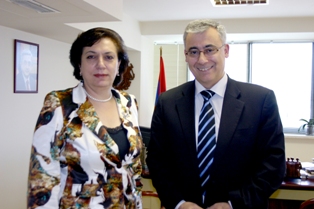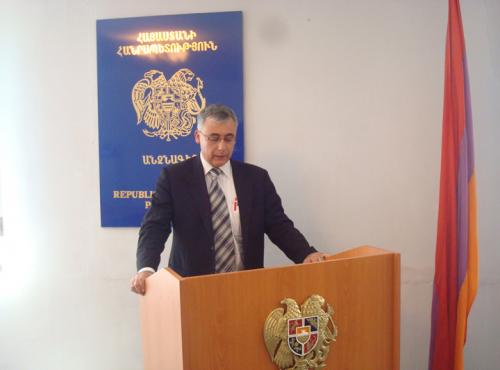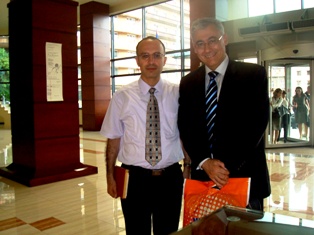
 On June 23, RA Minister of Diaspora Hranush Hakobian received Managing Director and Editor of Azad-Hye Armenian website (www.azad-hye.net) in the United Arab Emirates, writer, translator Hrach Kalsahakian.
On June 23, RA Minister of Diaspora Hranush Hakobian received Managing Director and Editor of Azad-Hye Armenian website (www.azad-hye.net) in the United Arab Emirates, writer, translator Hrach Kalsahakian.
H. Kalsahakian presented activities of the Arab-English website telling about Armenian communities of the Middle East countries, as well as possibilities of cooperation with the Hayern Aysor electronic newspaper of the RA Ministry of Diaspora.
Problems (registration) relating to dual citizenship raised by H. Kalsahakian, programs on teaching the Armenian language intended for Armenians of the Arab world and other issues were also discussed during the meeting. They also touched upon the issue of creating an address reference book of all-Armenian websites that will give a possibility of uniting the Armenian Internet potential, as well as the possibilities of assisting development of tourism in Armenia, taking into consideration H. Kalsahakian's experience in the sphere of tourism.
Source: “Hayern Aysor”, Yerevan, 24 June 2009
Editor: Arus Muradyan
Related: Embassy of Armenia in Abu Dhabi starts accepting citizenship applications (List of requirements included).
ADDITIONAL READING
 Founder and editor of Azad-Hye Arab-English portal Hrach Kalsahakian gets Armenian passport
Founder and editor of Azad-Hye Arab-English portal Hrach Kalsahakian gets Armenian passport
?
Hrach Kalsahakian, a citizen of Syria, now Sales and Marketing Manager at Cyprus Tourism Organisation in the United Arab Emirates, founder and editor of the Azad-Hye Middle East Arab-English Portal got a passport of a citizen of the Republic of Armenia. Deputy head of the Passport and Visa Department of the Republic of Armenia Vahagn Minasian officially handed RA citizen's passports to Hrach Kalsahakian and more than 50 other citizens.
hayernaysor.am electronic newspaper's correspondent was present there and witnessed the official ceremony of handing a RA citizen's passport. According to it, a passport is handed after reading the RA President's corresponding decree, when each person takes the oath under the state flag of Armenia, signs and gets a RA passport. A citizen getting a RA passport takes the oath to remain faithful to the Republic of Armenia, to keep the RA Constitution and laws, to defend the independence and territorial integrity of Armenia. He also pledges himself to respect the RA state language, national culture and traditions. The Armenian state anthem is performed at the end of the ceremony.
It should be noted as well that there were many people among those getting the citizenship of Armenia who almost do not know the Armenian language. It is also known that another 80 Armenians from the United Arab Emirates have applied for getting the RA citizenship.
The RA Minister of Diaspora received Hrach Kalsahakian the day before and got acquainted with problems of dual citizenship, took necessary steps for their solution.
Source: “Hayern Aysor”, Yerevan, 01 July 2009
Hrach Kalsahakian: All problems related to dual citizenship should be resolved.
The interview was conducted by Hakob Asatrian for “Hayern Aysor” (Armenians Today) 08 July 2009 (Link)
Hrach Kalsahakian was born in Greece, he works and lives in the United Arab Emirates, his parents are Syrian Armenians. His father was an educator who taught Armenian at schools of Middle East countries. Hrach Kalsahakian received primary education in Kuwait, then continued studies at the Karen Jeppe Armenian College in Aleppo. He received higher education in the city of Patras (Greece), specializing in tourism management.
– Mr. Kalsahakian, after your studies you returned to the Middle East…
Yes, I returned to the Middle East and began working in various countries. I settled in the UAE and now I work as Cyprus Tourism Organization's sales and marketing manager for the Middle East. In addition to my profession, I have always pursued Armenian issues, at a young age I translated from Armenian into Arabic such works as “Men without Childhood” by Andranik Tsarukian and “Life on the Old Roman Road” by Vahan Totovents. I also published a 330-page manual for Arabic-speaking learners of Armenian. Since 2002 I have been a member of the Syrian Arab Writers Union.
My intention is to present Armenian culture to the Arabs. They should know us from various aspects and we should also get to know them better. Using the new phase of information technologies is also of importance. An Armenian from Kuwait knows nothing about the activities of an Egyptian Armenian, an Iraqi Armenian has no idea what an Armenian from the UAE does, they do not help meet each other's needs. On the other hand, we should establish an information connection (via internet) with other Armenians worldwide: in Europe, the Middle East, and Americas. Gradually, we will have everybody interested in this process.
– That is why the idea of creating “Azad-Hye” probably arose?
In 2003 I launched “Azad-Hye” Middle East Armenian portal in Arabic and English with the aim of providing the Armenians of the UAE with information. Although the Armenians have lived there for 30 years, an Armenian church was founded only 11 years ago. They released “Shepor” bulletin for several years, distributing it in the church. The national bodies based in the cities of Sharjah and Abu Dhabi used to send news by fax only. At that time I started to implement with the aim that Gulf region Armenians and later the Middle East Armenians, could appear on the internet map of the world. In other words, the purpose is to post information on all known people, organizations and businessmen of our region, in order to be informed about the existing opportunities and find out how cooperation and joint projects could develop.
– How many Armenians are there in the UAE and in what spheres are they engaged?
There are 5,000 Armenians in the UAE, including some 3,000 in Sharjah, about 1,000 in Abu Dhabi and 1,000 in Dubai. The majority of them are engaged in industry and production, some conduct trade, there are also highly qualified professionals working with world-famous firms, high-tech experts who have come to the UAE from their countries and work in good conditions.
– In which of the Gulf countries: the UAE, Qatar and Kuwait, is the Armenian community better organized?
The Armenian community is well-organized in Kuwait as it is an Armenian community with a past. The Armenian High School in Kuwait (I also attended it) is a daily school with 12 grades that provide Armenian upbringing. It has about 400 pupils aged 3-17, whereas in the past, before the 1991 Iraqi Invasion, the number of its pupils made 700-800. At that period Syrian Armenians temporarily went back to Syria, although there were also some Iranian and Lebanese Armenians. It was impossible for Iranian Armenians to return to Iran so many of them migrated to the United States. Few Armenian citizens have settled in Kuwait since Armenia gained independence. Currently the majority of the Armenians in Kuwait are from Syria. Western Armenian is the language of instruction at the school. Armenian language, history, religion, as well as subjects of the governmental Arabic curriculum are taught there. Armenian weekly schools function in Sharjah and Abu Dhabi for the purpose of spreading knowledge of Armenian, with the number of their pupils making 140 and 70 respectively.
– What organizations exist in the Gulf countries?
Kuwait, the UAE and Qatar have a diocese under the patronage of the Armenian Catholicosate of Cilicia (Antelias, Lebanon). The diocesan body is elected every four years and it appoints four national councils in Kuwait, Doha (Qatar), Sharjah and Abu Dhabi. The national councils have their committees of women, youth, art, etc. In Kuwait, we also have a scout movement and “Shake” dance group composed of 40 pupils. It was set up in 2007 and their dancing-master is from Armenia. There are no dance groups in Sharjah and Abu Dhabi.
The publication of Azdarar electronic newspaper resumed in Kuwait, its print version is distributed in the church. This is the newsletter (editor-in-chief Karo Arslanian) of the Diocese of Kuwait and Arab Gulf Countries. Since January 2009, 20 issues of Azdarar came out. At first they published articles on Kuwait and republications from the Armenian press, then they started including news about other communities of the Gulf. This is a 20-page weekly in Western Armenian.
 Almost all of the above mentioned structures operate under the patronage of the Dashnaktsutyun Party (ARF). Outside it, the Armenian Cultural Association in Abu Dhabi functions. Every year it invites artists from Armenia and organizes Days of Armenian Culture in the UAE.
Almost all of the above mentioned structures operate under the patronage of the Dashnaktsutyun Party (ARF). Outside it, the Armenian Cultural Association in Abu Dhabi functions. Every year it invites artists from Armenia and organizes Days of Armenian Culture in the UAE.
We have a Dubai-based Azad-Hye Group. It holds monthly meetings on various issues, for example, next time we are going to discuss the details of dual citizenship.
The Armenian embassy in Abu Dhabi organizes one or two events a year. The last event was dedicated to Armenian jazz within the framework of the Dubai International Jazz Festival.
As regards the issue of churches, we have two churches – St. Vardanands Church founded in Kuwait in the 1960s and St. Gregory the Illuminator Church in Sharjah that has been operating since 1998. Archbishop Koryun Papian (Goriun Babian) is the Catholicosal Vicar in Kuwait and Arab Gulf countries.
– What are your expectations from the RA Ministry of Diaspora?
First of all, it is necessary to assess the situation in our communities based on some impartial sources, then the existing needs should be satisfied. This is certainly great work. People sometimes have difficulty getting in touch with the Ministry as they are accustomed to acting through traditional bodies and they have no idea how they can benefit from the Ministry. Nevertheless, if they do not contact the Ministry, then the Ministry of Diaspora should establish contacts with them.
We have no problems with textbooks: we receive Western-Armenian textbooks from Aleppo. Of course, it would be a good thing if we had electronic audio and video materials. For example, “Arevik” CD released in Aleppo was a big success. I will soon inform you about other issues.
During the meeting with RA Minister of Diaspora in Yerevan, we discussed the creation of all-Armenian Internet websites' addresses and a common newsletter. The Minister familiarized herself with all the difficulties of dual citizenship. We encounter problems related to the registration at apartments and for military service. It is a strange requirement that Diasporan Armenians should come and get apartment registration here, as a prerequisite for acquiring citizenship, even though they do not possess apartments in Armenia.
The next problem is the distortion of our names in Armenian passports. When our names are translated from English into Armenian, some “motley” names are being received. The Armenian version should be written at once so as not to distort Armenian names, and the English version can be retained. Also, it would be correct to complete the registration of young men for military service in one day. The passport giving ceremony is held at the passport department once a week – on Friday, whereas it should take place more frequently.
We also discussed with the minister the use of Arabic and the presentation of Armenian culture and history in the Arab world.
– You work as marketing manager of Cyprus Tourism Organization in the Middle East. Based on your experience, what expectations can Armenia's tourism have?
Armenia lacks sea and sand for mainstream tourism, but it has some other sectors such as religious, cultural, mountainous tourism, agro tourism, etc. Good opportunities exist for developing rural tourism in Armenia. The rural population should be able to repair their houses and create normal conditions in order to attract tourists with modern services and pleasant surroundings. It would promote local production and enable rural residents to benefit from tourism, on the other hand it would ease the strain on Yerevan. Armenia has much to display outside Yerevan.
It is also necessary to develop special thematic tourism, including wine making, astrology, trips to churches and monasteries. More importantly, the number of tourist facilities, first of all 3 star hotels, should be increased. Hotels for the middle class are needed. The apartments for rent are in a poor state and their conditions do not correspond to those advertized in the Internet. The hotels are rather expensive compared to the general situation in the country. Under such conditions we cannot compete with other countries which have fame, sea and other wonders. We should take into account that today Armenia is not widely recognized in terms of its tourism, if we evaluate on the scale of known destinations from 0 to 50, Armenia has no place on it. We have become a country visited by small and specific tourist groups. There are almost no tourists on board of planes from Dubai to Yerevan. Sharjah?s Air Arabia started operating flights, but later abandoned the idea as there were no tourists. Armenia is visited by people who have some links with it. For example, 300 thousand Europeans live in the UAE and they do not come to Armenia because the country is not presented there.
At the same time, according to Dubai's latest official data, last year Dubai was the second most visited city by Armenian citizens (about 25 thousand) – after Russia among CIS countries. Armenia does not participate in exhibitions held in Dubai, while Azerbaijan has participated 6 times and Georgia has been taking part since 2008. It would be a good start if Armenia were presented at Dubai?s Arabian Travel Market, the same way it is presented in the other international tourism exhibitions (Berlin, London, etc.)
Photo: Hrach Kalsahakian (right) and Hakob Asatrian in the Erebuni Plaza (June 2009), where the Ministry of Diaspora's offices are located. Erebuni Plaza is the rennovated building of the well-known Erebuni Hotel, few meters from the Republic Square.

